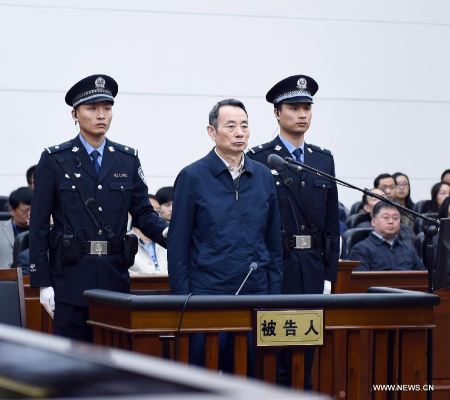
Jiang Jiemin (C), former head of the State-owned Assets Supervision and Administration Commission, stands trial at the Hanjiang Intermediate People's Court in central China's Hubei Province, April 13, 2015.
Jiang Jiemin, former head of the State-owned Assets Supervision and Administration Commission, went on trial Monday for corruption, a local court said.
Jiang faces charges of taking bribes, possessing a large number of assets from unidentified sources and abusing power while performing duties for a state-owned enterprise.
Jiang was chair of the board of China National Petroleum Corporation (CNPC) before working for the state assets commission.
According to the indictment, from 2004 to 2008 as head of the CNPC, Jiang took advantage of his post to help others obtain oil and gas exploitation rights, a gas turbogenerator bid and natural gas supply quotas, which severely disturbed the management of national oil and gas resources and led to grave losses of public property. Jiang was allegedly asked by Zhou Yongkang, who was charged with bribery, abuse of power and intentional disclosure of state secrets, to take advantage of his post.
Between 2004 and 2013, Jiang abused his power to seek profits for others in construction projects, promotions and other matters, and he asked for or illegally accepted money and goods worth more than 14 million yuan (2.28 million U.S. dollars) himself or through his wife from 14 units and individuals, prosecutors said.
As of Aug. 31, 2013, Jiang's personal and family property and expenditures "had apparently surpassed his and his family's legal income" and Jiang could not identify the sources of the surplus property worth about 14.8 million yuan, according to the indictment.
The defendant did not object to prosecutors' accusations.
According to prosecutors, all case-related evidence was authentic and obtained via legal methods, and the indictment accusing Jiang of taking bribes, possessing huge assets from unknown sources, and abusing power at a state-owned company was based on "clear facts and solid, abundant evidence."
Urging sentencing for the multiple crimes Jiang committed, the prosecutors recommended harsh punishment considering he allegedly demanded bribes.
However, they also recommended reduced overall sentences based on the fact that Jiang was willing to cooperate during investigations and voluntarily confessed more criminal details unknown to law enforcement at the time as well as the fact that all illicit funds and property had been recovered.
The defense did not object to the allegations about Jiang's crimes in general, but it argued that some facts raised by the prosecutors did not constitute the demanding and taking of bribes, and argued the specific amount of bribes and assets from unknown sources was uncertain. Jiang's defense urged the court to re-evaluate and gave an "objective and fair-minded" ruling.
The presiding judge stated that the prosecution and defense clearly delivered their views about the facts, evidence, the nature of the crimes and penalty and the court will fully consider their opinions.
Jiang pled guilty in his final statement.
"I confess to and regret the crimes I committed. I will fully reflect on (my wrongdoings) and accept correction so that I can be a useful person to society and do things that are conducive to society," he said in the statement.
He told the court that the facts of his crimes are "clear and certain" while the evidence is "true and precise."
"I am truly grateful for the help I received from the Party as well as the care and education from all people involved in the investigation and prosecution of my case," he said.
The court began hearing the case at about 8:30 a.m. The presiding judge announced an adjournment at about 3:30 p.m. The hearing will continue at an unspecified date.
Jiang's trial was held at Hanjiang Intermediate People's Court in Hubei Province. Representatives of the Hanjiang Branch of Hubei Provincial People's Procuratorate were present in court to support the public prosecution.
About 70 people, including deputies to people's congresses, political advisors, ordinary citizens and journalists, observed the trial.
The hearing was orderly and not only highlighted the authority of the law but also respect for the defendant's legal rights, said Li Jinping, a provincial legislator from Hubei, who was present.
"It was a vivid lesson about the rule of law," said Zhang Yun, a local government official who also observed the hearing. "It showed the central leadership's firm resolve to realize the rule of law and the authority of justice."
Investigation of the case was completed by the Supreme People's Procuratorate and the case was transferred to the Hanjiang Branch of Hubei Provincial People's Procuratorate on Feb. 15 for prosecution.
Prosecutors informed Jiang he had the right to hire defense lawyers, interrogated him, heard the defense's opinion and examined all case files.
Prosecutors filed the charges on March 19 to the court, sent Jiang a copy of the statement of charges and informed him of his legal rights.
The collegial panel held a pretrial meeting of prosecutors, the defendant and defense attorneys to hear opinions.
















































